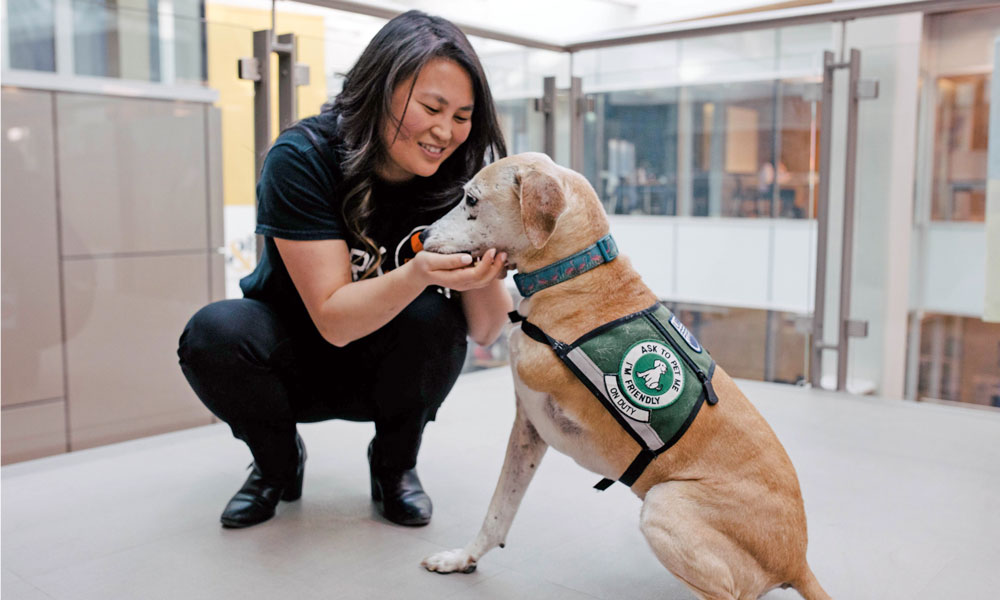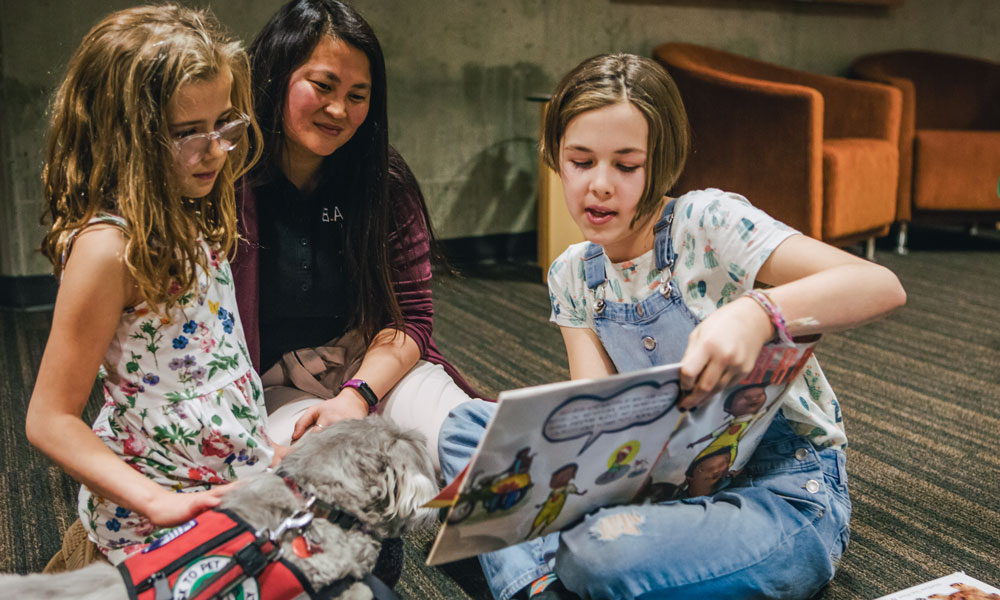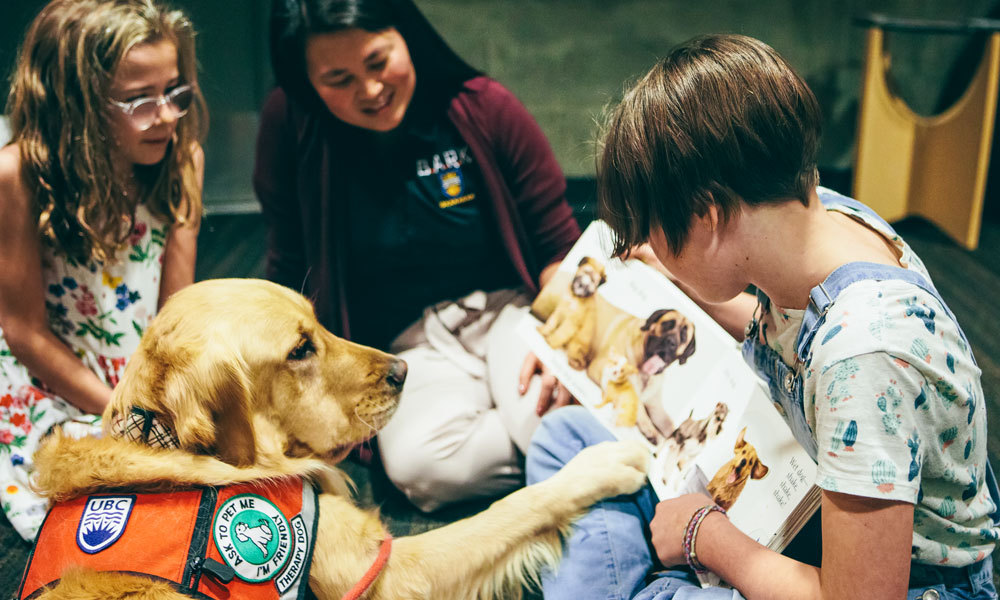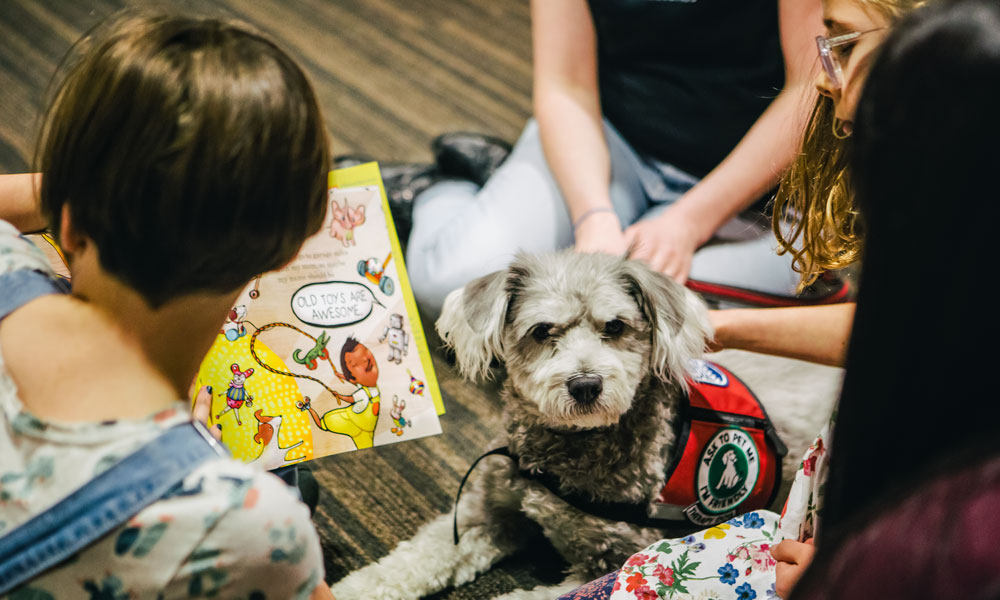
CRAIG, A THREE-LEGGED RESCUE DOG IS HARDLY a traditional contributor to an academic paper or dissertation.
But for Camille Rousseau, he’s an important collaborator—and beloved furry companion—as she seeks to understand how canine-assisted interventions help children who struggle with reading and public speaking.
In her search for doctoral programs focusing on canine-assisted interventions, Rousseau was introduced to Dr. John-Tyler Binfet and his B.A.R.K. therapy dogs. She now works alongside specially-trained B.A.R.K. dogs in one of the only research-driven canine therapy programs in Canada; B.A.R.K. is also the largest university-based program of its kind nationally.
Fortunately for Rousseau, UBC Okanagan was also the place where she was introduced to the Public Scholars Initiative (PSI), an innovative program started in 2015 at UBC Vancouver and launched in 2022 in the Okanagan. The inaugural cohort of Rousseau and her six colleagues are now part of a rich network of scholars with similar priorities.
“Ultimately, we want our research to serve the people we’re researching,” she says. “That means engaging in collaborative scholarly work with and for members of the community.”

Schnauzer mix Oscar listens while Annie (right) reads to her sister Ruby as researcher Camille Rousseau observes.

Golden retriever Abby listens while Annie (right) reads to little sister Ruby. Photos courtesy of Adam Lauzé.
Through multiple studies, Rousseau connected with the Central Okanagan School District to meet and interview educators and children to understand their experiences with public speaking in the classroom. She also included the perspectives of volunteer dog handlers, who she says often get missed in canine-assisted intervention research.
“My goal was to create a program to support these children because there wasn’t a lot of information readily available in the academic literature or empirical research on this topic,” Rousseau explains. “At the same time, it was important to consider the experiences of teachers and dog handlers, because they each have their own priorities and work underway to support childhood learning.
“As a result of the collaborative approach, we were able to co-create a program called PUPS (Pups Uplifting Public Speaking Competence), an evidence-based canine-assisted intervention program for children with public speaking anxiety.”
Rousseau says that being a public scholar has enabled her to bridge the gap between research and practice, something she appreciates given the timelines and potential positive effect of her research on students.
“Research that’s community-based and driven is a bit different than traditional lab research because the needs of the community often don’t match the timelines of academia. I believe public scholarship promotes new pathways to foster meaningful relationships with the Okanagan community. It’s also a commitment to responsible change for young people.”

Photo courtesy Adam Lauzé.
Dr. Serbulent Turan, Coordinator of UBC’s PSI program, agrees. “When someone asks me about the benefits of PSI, I use this analogy: If, on the day of their thesis defence a PhD student says, ‘You know what, I’m okay, I don’t need this,’ and decides not to pursue their defense, the world is still a better place because they conducted their doctorate research.
“It’s also a better place for a person, group or community who participated.”
He adds that doctoral work, however meaningful in the lab, doesn’t always translate to immediate positive change in the real world.
“If you discover something unbelievable in the lab, on average, it takes 17 years for that work to affect the policy field in Canada. In fact, very few people read an entire dissertation. The structure of the dissertation hasn’t changed since the days of Karl Marx.
“At UBC we took the steps to reimagine the PhD beyond traditional approaches in order to have a tangible effect on the public good.”
To date, almost 350 UBC public scholars have sought and continue to address complex questions and challenges through collaborations with more than 150 partners in more than 40 countries. From creating documentaries as dissertation chapters to updating provincial policies on pregnancies, from working with First Nations to strengthen access to healthcare and working with municipalities for disaster preparedness, the PSI has awarded almost $3.5 million in student funding for a wide range of dissertation topics.
Perhaps most importantly, it has created a global network of like-minded scholars who can connect and share research and knowledge.
In addition to funding, the program offers students professional development and networking opportunities, workshops, socials and other events to help them disseminate their research to a wider audience.
“It’s all about sharing research and having conversations around what it means to do research alongside the community, and how the university can support this direction and type of research,” Rousseau explains.
Rousseau and the rest of her cohort are evidence that a doctorate is more than just an individual pursuit of knowledge; rather, it’s a force for good, reaching beyond the university’s walls and shaping a future where academia and society are driven by a shared purpose to create a better world.
“The Okanagan is a great place for the PSI because the program has the opportunity to grow along with the campus,” Rousseau says. “Public scholarship has given me the chance to pursue human-animal research in a way that connects and helps everyone involved.”
*main photo courtesy of Adam Lauzé.